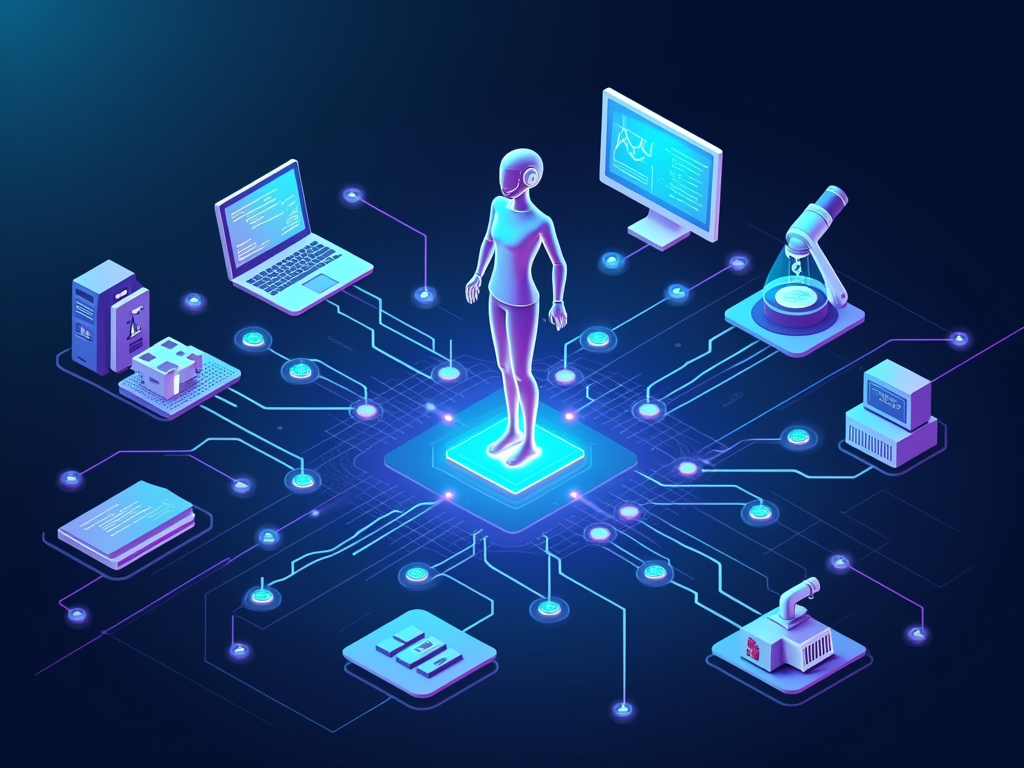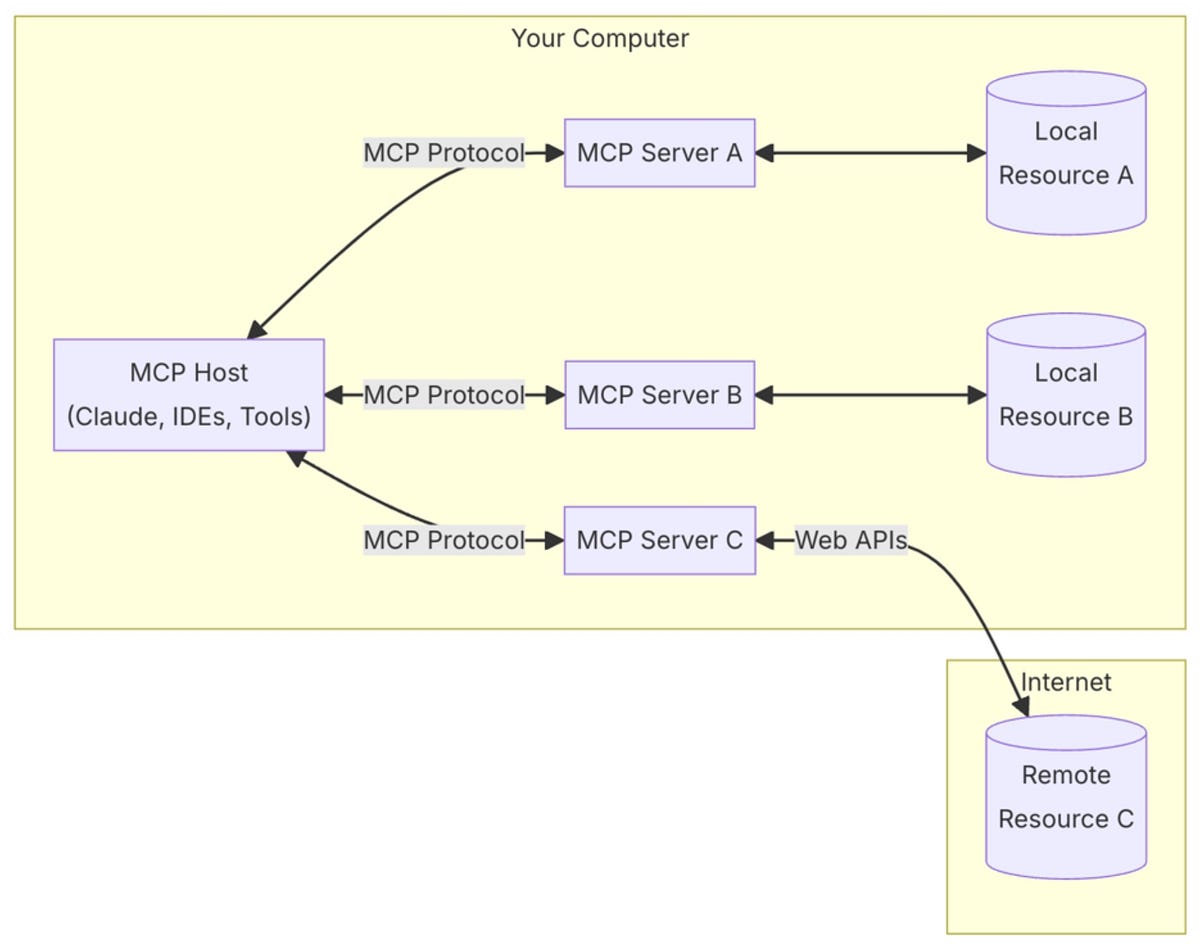How Model Context Protocol (MCP) Further Boosts Productivity
In today’s rapidly evolving technological landscape, productivity tools are constantly being refined and reimagined. Among these innovations, the Model Context Protocol (MCP) stands out as a revolutionary approach to enhancing how we interact with AI systems and leverage their capabilities. This article explores how MCP significantly boosts productivity across various domains.
What is Model Context Protocol (MCP)?
 MCP enables seamless integration between AI systems and external tools
MCP enables seamless integration between AI systems and external tools
Model Context Protocol (MCP) is a standardized communication framework that enables AI assistants to seamlessly interact with external tools, services, and data sources. Unlike traditional AI systems that operate within their own closed environments, MCP-enabled assistants can:
- Access real-time data from various sources
- Execute commands on external systems
- Utilize specialized tools for specific tasks
- Process and analyze information from multiple contexts
This interconnected approach transforms AI assistants from simple question-answering systems into powerful productivity partners capable of performing complex, multi-step tasks.
MCP Architecture: How It Works
 The MCP architecture showing how AI systems connect to local and remote resources
The MCP architecture showing how AI systems connect to local and remote resources
At its core, MCP establishes a standardized protocol for communication between:
- MCP Host - AI systems like Claude, integrated development environments (IDEs), and other tools that need to access external capabilities
- MCP Servers - Specialized middleware that provides access to specific tools, APIs, or resources
- Resources - Local files, databases, web APIs, and other data sources that the AI can access through the servers
The protocol works by:
- The MCP Host (e.g., an AI assistant) identifies when it needs external information or capabilities
- It sends a structured request to the appropriate MCP Server
- The MCP Server processes the request, accesses the necessary resources, and returns the results
- The MCP Host incorporates these results into its workflow, maintaining context throughout the process
This architecture allows for remarkable flexibility, as new capabilities can be added simply by connecting new MCP Servers without modifying the core AI system.
Classic MCP Implementations
Before diving into specific applications, let’s explore some notable MCP implementations that have transformed how we interact with AI:
Anthropic’s Claude Sonnet with MCP: Enables AI to access external tools, execute code, and interact with various APIs, significantly expanding its capabilities beyond text generation.
OpenAI’s GPT-4 with Function Calling: While not strictly MCP, this implementation allows the model to identify when to call external functions and what parameters to use, creating a similar bridge between AI and external tools.
LangChain Framework: Provides a standardized way for language models to interact with various tools and data sources, functioning as an MCP-like system for chaining together AI capabilities.
AutoGPT: An autonomous AI agent system that uses a protocol similar to MCP to enable self-directed task completion across multiple tools and services.
GitHub Copilot X: Integrates AI coding assistance directly into development environments through a protocol that allows the AI to understand code context and suggest appropriate completions.
Transforming Workflows with MCP
 MCP significantly reduces context-switching and streamlines complex workflows
MCP significantly reduces context-switching and streamlines complex workflows
Streamlined Task Execution
One of the most significant productivity benefits of MCP is the ability to execute tasks directly through AI assistants. Instead of switching between multiple applications and services, users can:
- Generate images using specialized AI models
- Retrieve and analyze data from various sources
- Execute system commands and run scripts
- Interact with web services and APIs
This streamlined workflow eliminates context-switching, which research has shown can reduce productivity by up to 40% when frequently interrupted.
Enhanced Problem-Solving Capabilities
MCP enables AI assistants to approach problems holistically by:
- Accessing relevant information across multiple domains
- Utilizing specialized tools for specific aspects of a problem
- Maintaining context throughout complex, multi-step processes
- Adapting approaches based on real-time feedback and results
This comprehensive problem-solving capability allows users to tackle more complex challenges efficiently.
Real-World Applications and Benefits for PhD Research
 MCP is transforming how researchers approach complex academic challenges
MCP is transforming how researchers approach complex academic challenges
Academic Research Enhancement
As a PhD student in Engineering Science at Harvard, I’ve experienced firsthand how MCP-enabled systems can transform the research process:
- Integrate multi-modal research data (experiments, literature, simulations) for comprehensive analysis
- Execute complex computational models across distributed research datasets
- Access and analyze scientific literature in real-time during research exploration
- Generate and validate hypotheses about research questions with automated experimentation
These capabilities can accelerate research cycles by 40-60% while improving research quality through more holistic data integration and analysis.
Literature Review and Knowledge Management
MCP significantly enhances the literature review process, which is crucial for PhD research:
- Automatically search and summarize relevant papers across multiple databases
- Extract key findings, methodologies, and results from hundreds of papers
- Organize research knowledge into structured, searchable databases
- Generate literature review drafts with proper citations and formatting
This approach can reduce literature review time by 70-80% compared to traditional methods, allowing more time for original research.
Data Analysis and Visualization
For complex data analysis tasks common in PhD research:
- Connect to multiple data sources and formats seamlessly
- Execute specialized analysis algorithms based on data characteristics
- Generate publication-quality visualizations with proper formatting
- Identify patterns and anomalies that might be missed in manual analysis
MCP-enabled data analysis can reduce analysis time from days to hours while improving the depth and quality of insights.
Technical Advantages of MCP Implementation
The technical design of MCP offers several key advantages that contribute to its productivity benefits:
Modularity: MCP servers can be developed independently and added to the ecosystem without modifying the core AI system, allowing for rapid expansion of capabilities.
Standardization: The protocol establishes consistent patterns for requesting and receiving information, making it easier to develop new tools and integrations.
Security: By mediating access to external resources through dedicated servers, MCP can implement appropriate security measures and access controls.
Persistence: MCP servers can maintain state between interactions, allowing for complex multi-step processes that would be difficult with stateless API calls.
Cross-platform compatibility: The protocol works across different operating systems, programming languages, and AI frameworks, creating a unified ecosystem.
The Future of MCP for Academic Research
As MCP continues to evolve, we can expect transformative developments particularly relevant to PhD students and researchers:
Research-Specific Tool Ecosystems: Specialized academic tools becoming available through MCP, from advanced statistical analysis to automated experiment design and execution
Enhanced Research Collaboration: Improved ability to maintain research context across complex collaborative projects, integrating contributions from multiple researchers seamlessly
Automated Academic Writing: More sophisticated automation of academic writing, helping researchers focus on novel ideas rather than formatting and structure
Personalized Research Assistants: Customized AI research configurations tailored to individual research domains, methodologies, and personal work styles
Cross-Institutional Knowledge Sharing: MCP-enabled systems that can securely access and analyze data across research institutions while maintaining proper attribution and intellectual property protection
Key Takeaways
- MCP transforms AI assistants from isolated systems into connected productivity tools that can interact with external resources
- The architecture of MCP allows for flexible, modular expansion of AI capabilities
- Productivity gains come from reduced context-switching, streamlined workflows, and enhanced problem-solving
- Academic research particularly benefits from MCP through improved literature review, data analysis, and knowledge management
- The future of MCP will likely bring more specialized tools and deeper integration into research workflows
Conclusion
The Model Context Protocol represents a significant leap forward in productivity technology. By enabling AI assistants to seamlessly integrate with external tools and services, MCP transforms how we approach complex tasks and workflows. As this ecosystem continues to grow and evolve, we can expect even greater productivity enhancements across all domains of knowledge work.
The images in this article were generated using the Cephalon Cloud Flux model API through an MCP server, demonstrating the very capabilities discussed. This integration of AI-generated content into the workflow exemplifies how MCP can streamline creative processes and enhance productivity in content creation.